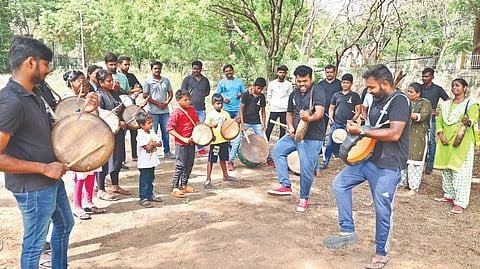

CHENNAI: Tall light banners with figures of several gods, goddesses and local deities illuminate the place. The loud music blasting through the speakers while Karakattam performers move their feet to the tunes coming out of the thavil, nadaswaram, and parai. Among all the sounds emanating from several instruments, the parai stood out alone, catching his attention.
The village thiruvizha in Coimbatore, his native, is where Sakthi Ravanan had his first encounter with the parai. “As a child I used to go attend every thiruvizha with my dad. When I first heard the beats that came from the parai, I was so mesmerised by it that I memorised the beats and tried replicating it on tables, chairs and any solid surface I saw. It was as though the instrument spoke to me,” he says.
The constant disregard that we receive as parai artistes is really saddening and our team strives to change it. My dream is to take the art of parai to every village, city and house. Which is why I am working on establishing a parai research centre and school of music. I have a long way to go and I feel determined as ever.Sakthi Ravanan
This interest grew on Sakthi and he played thudumbu and parai for his school band. He composed several parai beats as a teen. Talking about buying his first parai he says, “At the age of 18, I had decided to learn parai. My dad has always been supportive of my passion and goals. He, in fact, gave me money to buy the instrument.
“The unrest to own a parai, took me on a two-day journey. With no idea where to find or buy a parai from, I left for Palani with the hopes that I would somehow find a way because I had seen people play the instrument there. I reached my relative’s house and my uncle took me around. Every place that I went in the village, I was faced with some adversary or the other. Either the instrument was not of good quality or the skin was not firmly tightened.”
After spending close to Rs 60,000 for travelling around, Sakthi bought a used parai from an old gentleman. He says the experience kept his passion alive. After his formal education in B.Sc Computer Science and Masters in Computer Applications, he established a web designing startup with his friends while also pursuing his passion for parai. In 2016, he quit the company and started his own school, Nimirvu Kalaiyagam dedicated to teaching parai music.
“I wanted to try out the syllabus I drafted for my school and so I conducted a free three-day camp in Coimbatore. Only one person turned up to the camp, theatre artiste and activist Angel Glady. Regardless, I went ahead with the class and taught her,” he says.
He says that he did not feel dejected because he knew that things always start slow and patience is the key. Sakthi was under a lot of stress both financially and physically since he had no other income. After working hard for his passion and dream, Sakthi now has seven schools across five districts: Chennai, Coimbatore, Tirupur, Pollachi, and Karaikudi, with 300 students. The institute, which offers short term and one-year courses, teaches online for international students from the US, Germany, Dubai and Australia.
Talking about the challenges he faces as a parai artiste, “Parai as an instrument has always been a tool for politics. The instrument has been stigmatised so much that people associate the instrument only with death and bad omen. Even now when we are called for events, people don’t give us basic respect; they order us to come. The organisers don’t let us perform on stage because of the instrument we play. They ask us to play down in front of the stage. They have issues with purity,” he chuckles sarcastically.
Visit news.dtnext.in to explore our interactive epaper!
Download the DT Next app for more exciting features!
Click here for iOS
Click here for Android